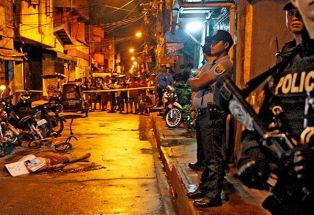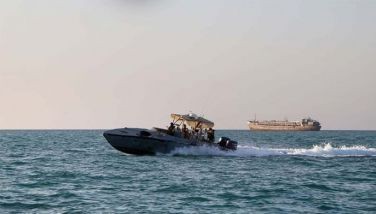Ateneo submits report on Philippine killings to UN body
MANILA, Philippines - The Ateneo Human Rights Center (AHRC) and students of the Ateneo Law School (ALS)’s International Human Rights Law class submitted a shadow report to the United Nations Human Rights Council on summary and extrajudicial killings in the Philippines amid the current administration’s war against illegal drugs.
The report, posted on the website of Ateneo de Manila University’s School of Law on Oct. 14, tackled four key issues: vague legal definition of extrajudicial killings; due process of law; presumption of regularity and command responsibility; and accountability and impunity.
“AHRC submits that the Philippine government has failed to address extrajudicial and summary killings,” the report stated, noting the Philippines was a party to the International Covenant on Civil and Political Rights and thus duty bound to address the spate of summary killings.
Shadow reports are submitted to treaty monitoring bodies at the UN and other international institutions as an alternative to a government’s official report regarding the human rights situation in the subject country.
The shadow report was submitted to provide additional information to the UN Human Rights Council for the Universal Periodic Review (UPR) of the Philippines in May 2017.
“It must be noted that the 1987 Philippine Constitution adopts generally accepted principles of international law as part of the law of the land. The (second) cycle of the UPR emphasized challenges of the Philippine government in addressing extrajudicial killings. The Philippines acknowledged these and stated that it would endeavor to enact laws, enforce those already existing and ensure the protection of human rights,” the report said.
For this reason, Congress enacted the Anti-Enforced or Involuntary Disappearance Act but this did not make any reference to summary and extrajudicial killings. “Thus, despite their unique nature, these crimes are still treated as murder or homicide under the Revised Penal Code,” the AHRC said.
“The Philippine Constitution values the human dignity of every person, and recognizes procedural and substantive due process as fundamental rights of every citizen. It protects the right of the accused to a fair trial, including the opportunity to be heard. It grants the people the right to be secure in their persons and homes against unreasonable searches and seizures. The protection of the right to life and liberty of all persons is also given primacy,” the AHRC said.
On the issue of due process, the report said the main criticism against the past administration regarding human rights was that it lacked political will to end the longstanding impunity enjoyed by the police and armed forces, a dysfunctional criminal justice system and military resistance to accountability.
In the current administration, the report said President Duterte made it clear that, “(he does not) care about human rights.”
“The present administration has released the so-called Duterte list, which contains names of government officials allegedly involved in illegal drug trade. Some of them were announced, causing the public to presume their guilt. Yet, no formal charges have been filed after the announcement,” the report noted.
On Nov. 22, 2012 the report said former president Benigno Aquino III issued Administrative Order No. 35 to address these issues along with Joint Department Order No. 003-2012.
But the AHRC said these programs were arguably ineffective because the public officers heading the task force created belonged to the same institutions as the alleged perpetrators.
Also, the report said the task force remained largely inactive.
The AHRC cited the cases of summary and extrajudicial killings that happened in the past years as well as in the course of the drug war.
“Children were also killed in police operations. Innocent victims are treated as part of collateral damage in this administration’s ‘war on drugs.’ President Duterte declared that the soaring number of killings of alleged criminal suspects is proof of the ‘success’ of his anti-drug campaign and urged police to ‘seize the momentum,’” the report said.
No urgency
Despite the government’s pronouncements that the summary and extrajudicial killings were being looked into, including those possibly perpetrated by the police, the AHCR said Philippine National Police (PNP) chief Director General Ronaldo dela Rosa made “no indication that the deaths merit urgent investigation.”
Under Command Memorandum Circular No. 16–2016, Project Double Barrel is the PNP’s two-pronged anti-illegal drug campaign plan to get both big and small drug personalities. It consists of Project Tokhang, which involves visits to houses of suspected drug users and Project HVT (high value target) or operations against suspected illegal drug syndicates and personalities.
Under the circular, suspected drug personalities who “voluntarily surrender” are required to fill out a voluntary surrender form, subscribed under oath before a notary public with the assistance of a counsel. They are then invited to the local police station to be interviewed and documented.
For house visits, a watch list of suspected drug personalities is provided by the barangays or local police stations. The names on the list come from police “assets” or anonymous tippers.
“No procedure or standards are set to verify the list. Neither is there any immediate recourse to clear one’s name from the list,” the report said.
On presumption of regularity and command responsibility, the report said police officers generally only have the power to arrest when a court issues a warrant of arrest or in cases of valid warrantless arrests.
“In the process of making an arrest, a police officer is allowed to employ reasonable force in case of resistance. When the resistance poses ‘imminent danger’ to the life of a police officer or any other person, it is considered a justifying circumstance and the officer is allowed to use excessive force,” the AHRC said.
“This justifying circumstance, however, is not to be presumed. The burden is on the police officer to prove the existence of such a circumstance. An abuse in the application of this presumption is used to justify killings, trumping the presumption of innocence,” it said.
The report said Duterte had been firm on his stand to fight drugs and crime and vowed to pardon any police or military personnel, including himself, involved in the extrajudicial killings.
“He also stated that he would stand trial on behalf of police officers if they were accused of unlawful killing. With the rising number of suspected drug pushers and users reportedly killed during police operations…Dela Rosa denies the claims that the PNP engages or incites the use of extrajudicial executions,” the report said.
- Latest
- Trending






























